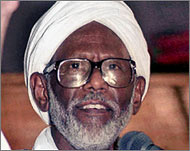Sudanese peace agreement signed
Sudan’s government and southern rebels have signed a peace deal ending Africa’s longest-running civil war.

Sudan‘s First Vice-President Ali Usman Muhammad Taha and John Garang, chairman of the rebel Sudan People’s Liberation Movement (SPLM), signed the accord at a ceremony in Kenya‘s capital, Nairobi, on Sunday.
The accord ended 21 years of conflict in the south that has killed an estimated two million people, mainly through famine and disease.
The peace deal does not cover a separate conflict in the Western Darfur area of Africa‘s largest country, where almost two years of fighting has created what the United Nations says is one of the world’s worst humanitarian crises.
As 12 African heads of state or government and US Secretary of State Colin Powell looked on, Garang and Taha put their names to a series of protocols signed by junior colleagues over two years of talks that together constitute an overall accord, including a permanent ceasefire.
Under the agreement, the ruling National Congress and the SPLM will form a coalition government, decentralise power, share oil revenues and integrate the military.
At the end of a six-year interim period, the south can vote for secession.
Wider support
For the peace deal to ensure long-term success in the large and diverse country, opposition parties have said the accord will need a wider support base.
|
“We have to work together to make peace work”
Al-Bagir Ahmad Abd Allah, member of the DUP’s executive |
Observers say Sunday’s agreement needs to be inclusive of other political parties with huge popular followings for peace to last.
Both the Democratic Unionist Party (DUP) and the Umma party – the two mainstream northern political parties – welcomed the peace deal.
The DUP reopened its office in Khartoum on Friday, after years of opposition in exile to the NC government, which overthrew Sudan‘s democratically elected government in a bloodless coup in 1989.
“We have to work together to make peace work,” said al-Bagir Ahmad Abd Allah, a member of the DUP’s executive. He said the DUP would cooperate with the transitional government, which will be dominated by the two warring parties until elections are held within four and a half years.
Political parties
Under the deal, the National Congress will take 52% of parliament, with the SPLM controlling 28% of seats.
 |
|
Turabi was jailed last year |
Other northern parties will have 14% while other southern parties 6% of the national assembly.
The Umma party, led by the popular Sadiq al-Mahdi, whose family has dominated Sudanese politics since independence from Britain in 1956, said it would not join the transitional government unless a national conference was held to include all political factions.
“The National Congress is the only party in Sudan which is opposed to holding an all-party national conference,” Umma Party secretary-general Abd al-Nabi Ali Ahmad said. “Without this we will not join the transitional government,” he said.
Possibly the sharpest thorn in Khartoum’s side is President Umar Hasan al-Bashir’s former ally Hasan al-Turabi, jailed last year without charge amid accusations he incited tribal tensions in Darfur.
Many believe he will be released after the peace deal, when emergency laws will be lifted in most, if not all, of the country.
Turabi’s Popular Congress was suspended early last year after the government accused it of involvement in three coup attempts. Khartoum also says one of Darfur‘s two main rebel groups is the armed wing of the Popular Congress.
The party will not join the transitional government, but plans to concentrate its efforts on winning popular support at future elections.
Southern opposition
Sudan faces conflict on many fronts, mainly in the south where rebels have been fighting the government since 1983, when Khartoum introduced Islamic law to the whole country.
|
“It will not be easy – getting the deal was the easy part. Now they will really have to work hard at keeping this country together” Unnamed senior Western diplomat in Khartoum |
“Garang is very positive,” Darfur rebel Sudan Liberation Army (SLA) leader Minni Arcua Minnawi said. “Definitely we will be happier with the government when he becomes part of it.”
But Garang may be kept busy keeping control throughout the south.
Rumours that his deputy Salva Kiir Mayardit was planning a revolt because he was unhappy with parts of the deal were stoked by his absence at the signing of the final protocols on 31 December.
However, Mayardit appeared alongside Garang at a news conference in Nairobi on Saturday, and Garang told the reporters the two men had no differences.
Violence is also ravaging Darfur, where a rebellion began in February 2003 after years of tribal conflict over scarce resources. The rebels accuse the government of neglect and of using Arab militias, known as Janjawid, to loot and burn non-Arab villages.
Khartoum acknowledges arming some militias to fight rebels but denies any links to the Janjawid, calling them outlaws.
Tens of thousands have already been killed in the Darfur war and nearly two million forced to flee their homes.
“It will not be easy – getting the deal was the easy part,” said one senior Western diplomat in Khartoum. “Now they will really have to work hard at keeping this country together.”